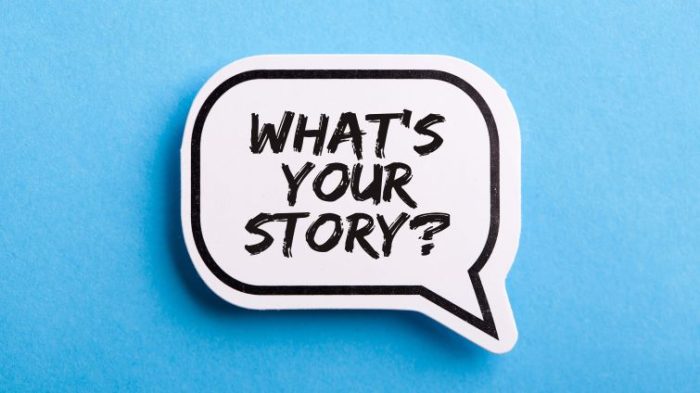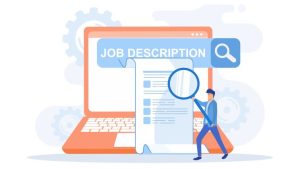How to Create a Compelling Career Story (And How to Showcase It)
 Publié le 3 June 2024
Publié le 3 June 2024
When you’re on the job hunt, stand out by knowing how to create a compelling career story and how to showcase to recruiters and hiring managers.
When writing a resume, the word “fun” isn’t the first thing that comes to mind. Today, we drum up resumes to make it through automated candidate screening processes. At the minimum, we hope to at least catch the eye of recruiters.
Unfortunately, this means that most resumes look similar, following the same formulaic templates.
How can you hope to stand out from the mob of applicants? A career story is the cure for drowning in the cloud.
This guide explains why knowing how to create a compelling career story can enhance your job candidacy.
What is a Career Story?
A career story is the narrative behind your professional development and experience. It’s the talents and skills you’ve acquired as well as the goals, objectives, and other achievements of your story so far.
Labels are only part of the story. Say you have experience managing programming teams and .ai domains for tech companies. Someone may think, what is an .ai domain other than for companies that work with artificial intelligence? How does that impact your career story? Likewise, they could think that a computer science degree means you are supposed to be a developer. However, your time managing programming teams instead proves you’re cut out to be a project manager.
Creating a structured career narrative gives recruiters a compelling arc of who you are. It also clarifies why you’re applying for a specific role with style.
Why is a Compelling Career Story Important?
Resumes and CVs paint a basic picture of your life experience. A career life story gives HR professionals a tailored view of what makes you unique and why you’d be a good fit. It provides you with a platform to let your uniqueness shine through the rigors of the recruiting and hiring processes.
In January 2024, U.S. job openings dropped to their lowest point in nearly three years. That means fewer jobs to go around for the same number or more of job seekers.
Job applications are up over 300% for business and technical roles since January 2021
Image sourced from ashbyhq.com
Additionally, job applications are on the rise. An Ashby report found that job application volumes have more than tripled for business and technical roles.
This surge emphasizes the importance of crafting a compelling career story, as it not only helps you stand out amidst increasing applicant volumes but also ensures a smooth transition during new hire onboarding processes. A career narrative helps you rise to the top of increasing applicant volumes.
The Benefits of a Career Story
If you like writing (or talking about yourself) at all, creating a career story provides ample entertainment—but that’s not why you’re writing it!
Let’s examine some of the benefits of building a career narrative.
- Better self-understanding: it requires you to take a lifetime view of your career. You discover every milestone, influence, and inspiration, leaving no stone unturned.
- Stand out from the crowd: your upbringing, background, and interests are full of experiences that shape who you are. Career stories make you memorable and demonstrate real-world abilities.
- Build talking points: inspiration from family members, qualifications, promotions, and other narratives provide a platform for discussion. When writing a cover letter or sitting down for an interview, you’ll already have plenty of ammo for conversation.
- Easily answer questions: interviewees ask questions like “When did you overcome a significant obstacle in your last role” or “Why are you a good fit for this position?” Your career story is full of peaks and valleys that you can freely pull from as and when needed to answer tough interview questions.
- Curate your professional brand: instead of just listing out degrees and past job titles, a career story lets you put your spin on the narrative. You can identify themes that tie up a lifetime of experiences. Just as businesses use a paid email service to curate their brand in their own way, a career story empowers you to portray yourself in the way you want.
What Career Life Stories Should I Tell?
Alright, so now it’s time to start building that narrative. You don’t want to tell the entire story. Who has time for that?
So the question is, what types of stories should you tell?
Origin Story
Free to use image sourced from Unsplash
An origin career story helps demonstrate early passions and aptitudes.
Like any good novel or Hollywood blockbuster, you need a clear origin story. It’s the beginning of your story arc that hopefully reaches the climax of you acquiring a new job.
Maybe your path into engineering started with building models as a child. Another example would be if your journey into graphic design started when your parents bought you your first watercolor set.
Share a genuine experience of when the first career lightbulb started flickering.
First Milestones
After your humble beginnings, it’s time to share a few “firsts.” Maybe you won an award at a science fair or a school spelling bee. You could have been awarded an academic or extracurricular scholarship to attend a university.
Another milestone is your first relevant job. Perhaps working as a waiter taught you customer service skills that contribute to your value as a business development manager.
Demonstrate moments in your early life that showed you had the talent for the career you’ve chosen.
Transitions and Growth
Anytime things get uncomfortable, you’re required to progress and evolve. These types of experiences are natural narratives that will have interviewers’ ears perked up with interest.
Transition stories can be a change in career or taking on a role with more responsibilities, like overseeing remote teams and implementing strategies for effective remote worker monitoring. Adapting to the nuances of remote work environments and optimizing productivity through remote worker monitoring tools can be pivotal experiences in such transitions.
There can also be times when you’ve tried something different that didn’t work out. That’s okay, relay to hiring professionals how you learned from those experiences about yourself and the job.
Smashing Challenges
Make sure your career story demonstrates how you’ve overcome challenges during your life. Carving these experiences helps you navigate those inevitable interview questions with ease.
A career story better positions you to attain one of the 275,000 jobs added to the market.
Image sourced from nytimes.com
The US Bureau of Labor Statistics announced that 275,000 jobs were added to the market in February 2024. Use stories of overcoming obstacles to help you grab one of those openings. Choose narratives that help paint the picture you want to sell to recruiters.
For example, talk about the time you managed an understaffed retail store but still hit your quarterly KPIs. If you work in IT, mention that time the online phone numbers of your last company went down. Explain how you used freemium phone apps to circumnavigate the issue.
Major Influences
Everyone loves a good buddy comedy or story that pairs a wise sage with a young up-and-comer. Highlight one or two major mentors who influenced your career path.
For example, let’s say your grandmother was a published author. She wasn’t well-known but was a working writer. Since the time you were a child, your grandmother was always there to critique and encourage your writing. You wouldn’t be the pragmatic copywriter you are today if it weren’t for her.
Now, doesn’t that sound much more interesting than just mentioning a writing workshop you attended?
Share the Story of Your Future
Not every story has already happened. Be sure to sum up your career life story, mentioning your plans for the future. Yours could be a story about reaching the level of executive or manager. Maybe it involves you venturing into higher or more specialist roles related to your field.
It’s okay to let your future employer know that this next role is only a stop on the way to your destination. They’d likely rather hire someone with purpose and ambition rather than worry about finding someone happy to stay put forever.
How to Craft a Compelling Career Story
Alright, so you’ve got these pieces of a complete career narrative. How do you put it all together as one cohesive and captivating tale?
- Write an attention-grabbing opening
Free to use image sourced from Unsplash
Create an opening statement that grabs and holds people’s attention. For example, in the copywriting example, you could start by discussing your grandmother and how their influence lives on through your writing.
Alternatively, it could be a personal anecdote about how seeing the film Jurassic Park made you want to become a geneticist. Be authentic and willing to share something real.
- Outline career highlights
Choose career stories that take hiring professionals on a journey from your early successes to your most recent achievements. Talk about roles you excelled in and what you learned from them.
Hit on awards and other recognition received that prove your talents and career skills.
- Mention your career goals
Weave your career goals into each narrative component. For example, while discussing your origin story, you can mention your goal to get a specific degree or entry-level position.
Telling career life stories this way demonstrates you know how to set and reach your goals. Of course, be sure to sum up your plans and how the potential employers fit into those plans.
- Tie it all together with key themes
You’ve been working on your career story for… well, your entire career. Hopefully, the components you choose already share common themes and ideas. However, don’t leave things up to interpretation.
Think of themes like domain names. Is .tech a good domain name for a software company? You bet it is. So what theme or domain sums up your narrative?
For example, your time in student government and your sociology degree show a passion for people.
Find one or two themes that are relevant to your career and bring them into your story to put a stamp on your brand.
- Engage the audience with a call to action
Not all stories need a definitive ending. In this case, you want to leave a cliffhanger in the form of a direct call to action. Call upon the reader or listener to get in touch for further discussion or information: “Please email _____ so that I can explain more about why I’m a good fit for your ___ position.”
Employers Want to Hear Your Career Story
A career narrative is the backbone of your job seeking. It’s your cover letter, interview answers, and elevator pitch all packed into one. Whether written down or via rote memorization, you’ll be prepared to answer vital questions. By knowing how to create a compelling career story, you’ll also be ready to market yourself and your unique story to a willing audience.
You add to your career life story every day; organize it into a compelling screenplay that makes you different from other applicants.







